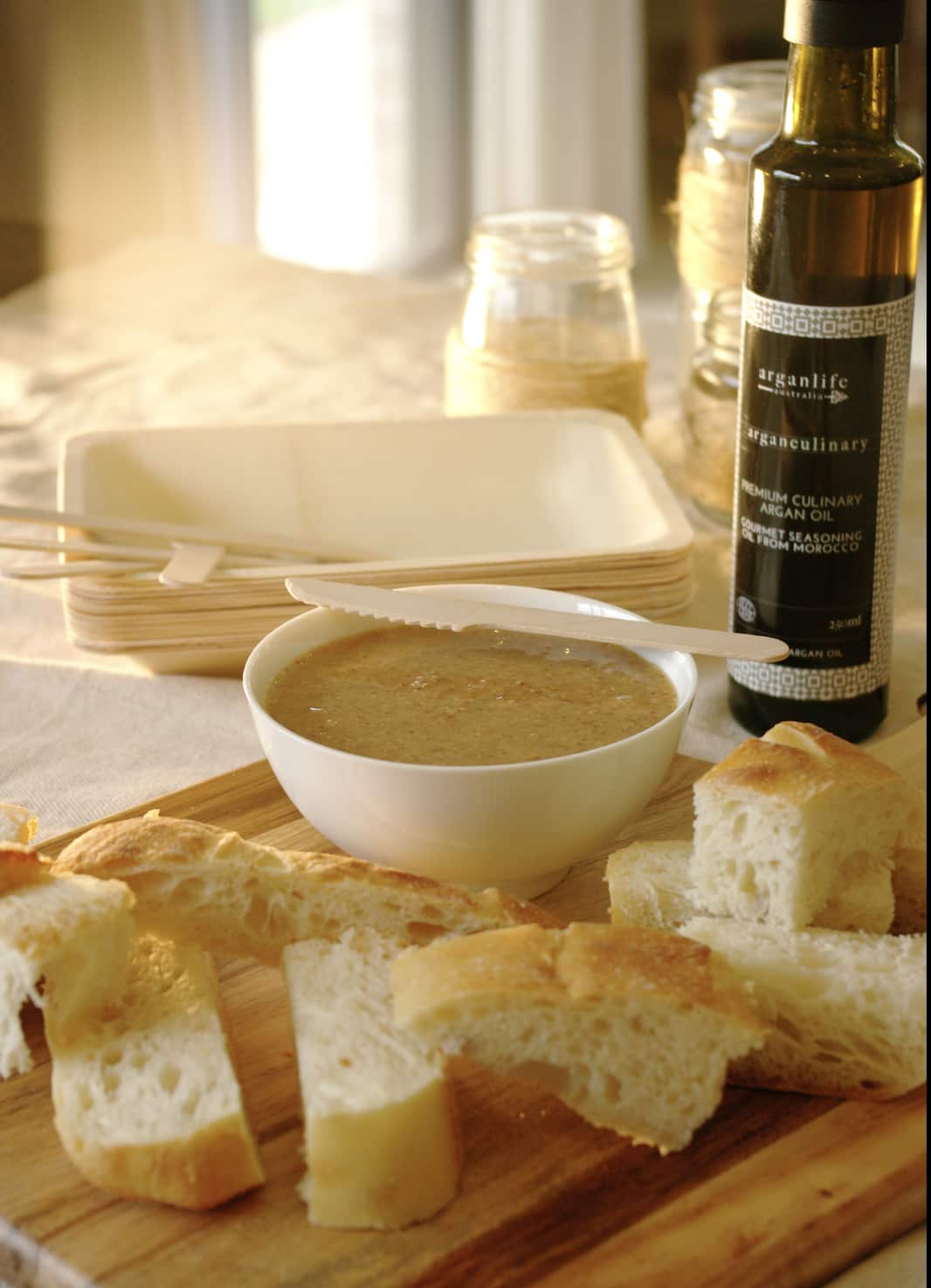The popular hair product, argan oil is the savour of frizzy-maned folk across the Western world. We use the miracle oil, sourced from the argan tree fruit grown in North Africa, to smooth our locks. We rub it in our skin, use it in some cosmetics and add it to shampoos and conditioners. But can we eat it?
It’s a reasonable question. After all, coconut oil advocates cook with the oil as well as put it in their hair and on their skin. Olive oil, used for cooking, has also been used as a skin and hair care product for centuries.
The owner of Argan Life, Sally Gulliver, says yes. You can’t eat the stuff you put in your hair as it’s probably got a very low level of argan oil in it, along with a few other chemicals. But you can eat pure culinary argan oil.
Argan oil was first used for culinary purposes in Morocco.
Gulliver, a trained psychologist, started Argan Life in 2011 and has been importing argan oil for cosmetic and culinary purposes from Morocco into Australia ever since.
“Argan oil was first used for culinary purposes in Morocco,” says Gulliver. “For thousands of years, women used to make it a culinary oil and use it medicinally, topically for arthritis complaints and to treat burns.
“But the culinary version of argan oil is made by cracking open the argan nuts from the argan tree fruit to get the kernels,” Gulliver says. “You roast the kernels first, which are then either ground by hand in a stone grinder or cold-pressed by machine to get argan oil.”
The difference between cosmetic and culinary argan oil, she says, is that the cosmetic version uses unroasted kernels and the argan oil made as a food product uses roasted kernels.
“You can see the difference with culinary argan oil – it is slightly dark in colour depending on how well the kernels were roasted. It has a very distinctive nutty aroma which cosmetic oils don’t have.”
One traditional dish featuring argan oil in Moroccan cuisine is ‘amlu’ (also called amlou or amlou).
“It’s eaten for breakfast or as a snack to dip your bread in,” she says. “It’s made with finely grounded roasted almonds and argan oil, which is added to the almonds until it becomes quite runny. Then you add honey to the mix for flavour. It’s really delicious.”

Argan oil should not be used at heat for frying but rather included in dishes, served at room temperature. That makes it suitable for use as a dressing oil and can replace uncooked olive oil in most meals.
“Culinary argan oil has a savoury and sweet use. It’s nice to add to hummus or on top of a soup, like a lentil soup after it’s cooked. It’s also good on grilled fish or you can toss it through a seafood pasta or couscous. Or you can mix it with Greek yoghurt, honey and mixed berries, and is nice with ice cream.”
Don’t be afraid to taste argan oil. It’s worth eating.
The downside is that authentic argan oil is pretty pricey, going for almost $20 for a 100ml bottle.
“Argan oil is expensive because it comes from one source – one area – in the whole world. Shipping costs push it up and the product is quite labour intensive.”
‘Authentic’ argan oil, Gulliver says, should be made by Berber women in southwest Morocco where the argan trees are grown. This is because Berber women traditionally have the role of cold-pressing the oil.
Gulliver currently buys her cold-pressed argan oil from one female coop in a small village, which has around 50 Moroccan women working to produce argan oil. “By buying the finished oil from the women in the villages, it increases the viability of their co-op.”
What about the health benefits?
Apparently, argan oil is not only an interesting addition to your meals, but it’s also good for your heart.
Studies suggest that argan oil is traditionally well known for its ability to protect your heart health and prevent cardiovascular disease. Research published in the British Journal of Nutrition (2011) saw that 20 healthy Algerian subjects who consumed a small amount of argan oil with toasted bread for breakfast for a month had “higher plasma vitamin E concentrations, lower total and LDL-cholesterol [low-density lipoproteins or bad cholesterol]… improved plasma and cellular antioxidant profile when compared with controls”.
The study concluded that argan oil is able to modify the markers of cardiovascular disease.
“Don’t be afraid to taste argan oil,” says Gulliver. “It’s worth eating. It’s a really lovely oil to have, as it’s healthy, really delicious and tasty. And if you really want to add an authentic Moroccan touch to your food, then argan oil is an essential component to have in your meal.”
SBS Food is a 24/7 foodie channel for all Australians, with a focus on simple, authentic and everyday food inspiration from cultures everywhere. NSW stream only. Read more about SBS Food
Have a story or comment? Contact Us

